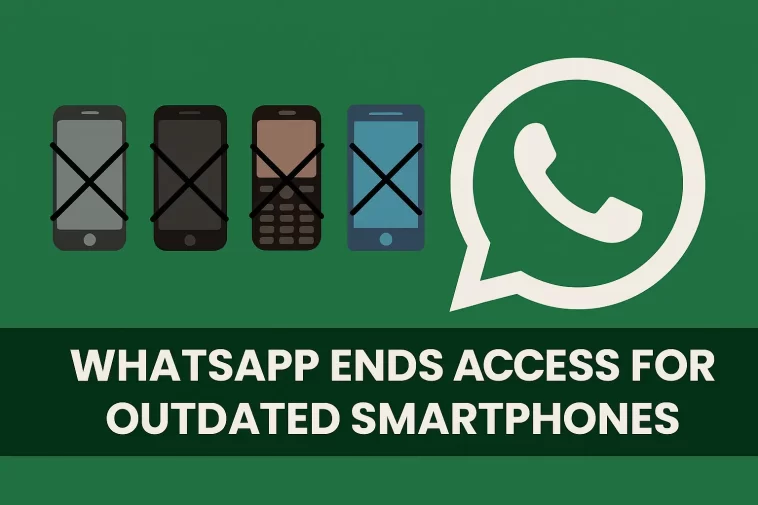Millions Affected as WhatsApp Phases Out Compatibility for Aging Android and iOS Devices
WhatsApp—the world’s most widely used messaging platform with billions of users—has once again updated its list of supported mobile devices. As part of its ongoing modernization strategy, the company will discontinue support for several older Android and iOS smartphones starting November 15, 2025.
This change means that certain popular models from brands such as Xiaomi, Samsung, Huawei, HTC, Sony, and even older iPhone models will no longer receive updates and will soon become unable to run WhatsApp entirely.
WhatsApp periodically removes support for devices that can no longer meet the technical requirements of the app’s latest features. While this ensures a more secure experience for active users, it leaves owners of older phones with an important decision: upgrade or lose access.
Why WhatsApp Is Ending Support for Older Devices
According to WhatsApp’s official support page, the platform requires minimum operating system versions to maintain performance, security, and access to new features.
The updated minimum requirements are:
- Android 5.0 (Lollipop) or newer
- iOS 15.1 or newer
WhatsApp highlights that older operating systems struggle to support advanced features such as enhanced encryption, updated multimedia APIs, and background service optimizations. Moreover, older hardware often cannot run the latest versions smoothly, leading to crashes, delays, and vulnerabilities.
The company states:
“If your device no longer meets our requirements, you will receive notifications prompting you to upgrade. We continue to focus on delivering secure and reliable messaging.”
How to Check if Your Phone Still Supports WhatsApp
If you’re unsure whether your device will remain compatible, you can manually verify your OS version.
For Android Users
- Open Settings
- Navigate to About Phone
- Locate Android Version
If your phone runs Android 4.x or an older version, WhatsApp will stop functioning on your device.
For iPhone Users
- Go to Settings
- Tap General
- Open About
- Check your iOS Version
If your iPhone uses iOS 15.0 or earlier, support will be discontinued.
Users may also notice early warning signs such as:
- Inability to install new WhatsApp updates
- “Device no longer supported” notifications
- WhatsApp disappearing from search results in the Google Play Store or App Store
Devices Losing WhatsApp Support Starting November 15, 2025
WhatsApp’s latest update impacts hundreds of smartphone models, particularly those released around 2015–2016. After this cutoff date, these devices will no longer receive updates, and eventually WhatsApp will completely stop opening.
Here is the confirmed list of major models losing support tomorrow:
Android Devices No Longer Supported
- Huawei Mate 9 Pro
- Samsung Galaxy S7
- Xiaomi Mi Note 2
- HTC 10 evo
- Sony Xperia XZ
- Xiaomi Mi 5 Pro
- Samsung Galaxy C9 Pro
These devices initially stop receiving updates, followed by full inaccessibility once the app can no longer run on outdated OS levels.
iOS Devices Losing Access
- iPhone 6
- iPhone 6s
Both models, already unable to update beyond older iOS versions, fall below WhatsApp’s new requirements.
What Happens When Your Device Becomes Unsupported?
WhatsApp’s transition process typically follows these steps:
1. Update Restrictions Begin
The app stops offering updates on the Play Store or App Store.
2. Features Gradually Fail
Some features—such as voice notes, media downloads or message backups—may begin malfunctioning.
3. Full Access Is Blocked
Eventually, users will see the message:
“Your device is no longer supported.”
At this point, WhatsApp will not open at all.
Why 2016-Era Phones Are Being Removed Now
The affected devices share common limitations:
- Lower RAM (often 2 GB or less)
- Outdated CPUs unable to handle new encryption protocols
- Lack of security patches for years
- Inability to run Android 5.1+ or iOS 15.1+
WhatsApp’s recent updates—such as HD photo/video support, AI-based features, and enhanced multi-device connectivity—simply cannot operate efficiently on this older hardware.
Should You Upgrade Your Smartphone?
For users with unsupported devices, upgrading is the only solution. While the announced list affects older models, many budget-friendly smartphones in 2025 offer:
- Strong performance
- Long-term update support
- Affordable prices
WhatsApp strongly recommends using the latest available OS version on your device to ensure:
- Better security
- Fewer bugs
- Compatibility with new features
Which Devices Are Still Safe to Use in 2025?
As of today, WhatsApp supports:
- All Android phones running Android 5.0 Lollipop or above
- All iPhones running iOS 15.1 or newer
This includes most modern Xiaomi, Samsung Galaxy, Pixel, Realme, Oppo, Vivo, Honor, and Huawei devices released after 2017.
Conclusion: WhatsApp Users Must Prepare for the Change
Millions of users worldwide will be affected by WhatsApp’s latest compatibility update. If your smartphone is on the unsupported list—or close to it—the safest option is to upgrade soon.
WhatsApp’s decision, while frustrating for some, follows a familiar pattern: enhance security, optimize performance, and focus resources on modern systems.
If you want to continue using WhatsApp seamlessly, make sure your device is running the required operating system—or plan to update your phone before the app shuts down entirely.

